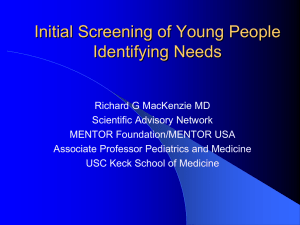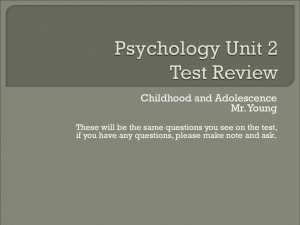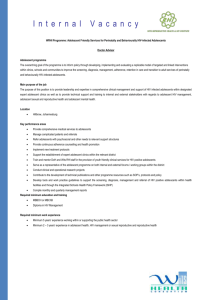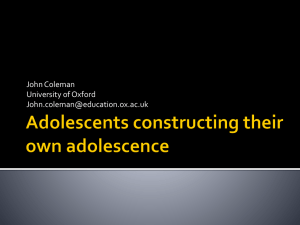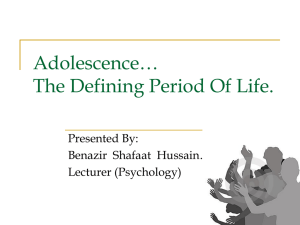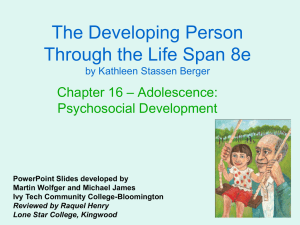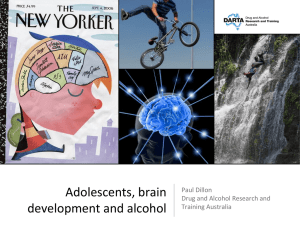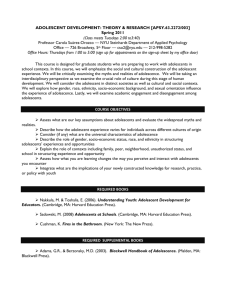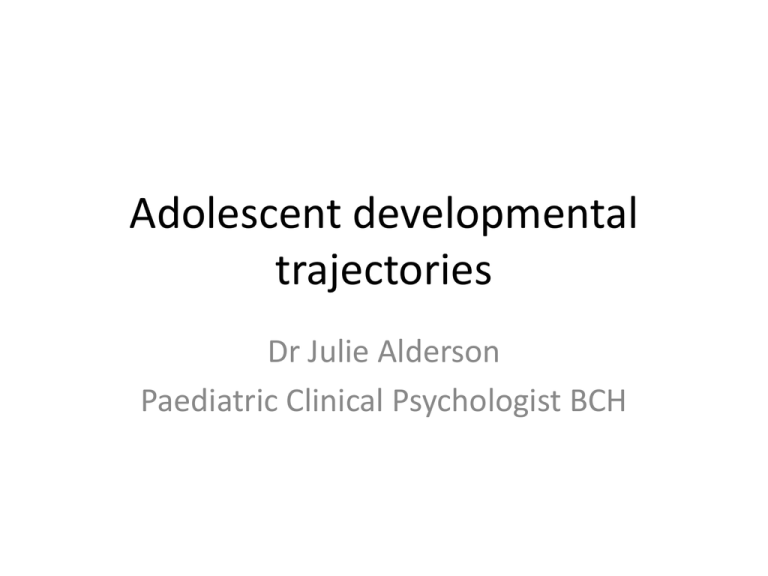
Adolescent developmental
trajectories
Dr Julie Alderson
Paediatric Clinical Psychologist BCH
Aims
Revision: what adolescent development is
Recent advances: adolescent thinking
Position: the adolescent “patient” within family
and healthcare systems
Prompt thinking: how cancer & treatment can
impact on adolescent development
Adolescent to adult
Theorists
Freud - psychosexual development, adolescence
as a recapitulation of the development of
sexual awareness in infancy.
Piaget - cognitive development, seeing the
development of abstract thinking abilities as
making possible the transition to independent
adult functioning.
Erikson - development of personal identity
Biopsychosocial
Adolescence involves biological (puberty,
sexual development & brain) , psychological
and social changes.
To Do
Challenge authority
Seek spiritual paths
Take risks
Experiment with drugs,
alcohol and sex
Change educational
environment
Challenge moral and
social structure of
society
Develop relationships
Demand rights
Understand sexuality
Renegotiate rules at
home
Take responsibility for self
and others
Get job
Nutshell
• Grow up
• Find self
• Get a sexuality that fits
The problem/beauty of adolescence
• the Piagetian concept of "formal operations"
in thinking style not established.
• egocentric and feel invulnerable to harm.
• depend more on intuition than rational
thinking.
You said my risk of developing skin
cancer is greater than other peoples’
Concrete:
Well, I’ve had holidays in
Spain for the 5 years
before coming to this
clinic and I’ve come to
no harm. My skin copes
well with sun.
Abstract:
I’ve seen no problems yet
but I may have already
done some damage and
increased my risk
further. I’d better be
extra careful in future –
just in case.
Neurological development
Adolescents are not
adults.
They are on their
way to becoming
adults.
Early to mid 20’s
The prefrontal cortex
(PFC) is one of the last
areas of the brain to
mature
Executive functions are
not reliably in full effect
• Make complex
judgments
• Weigh closely
competing alternatives
• Control impulses
• Take the long view.
• Interpretation of body
states (Baird & Bennett, 2006)
• Intention (Blakemore et al,
• Visuospacial working
memory (Kilgore et al, 2002)
• Interpretation of
emotional stimuli (Baird
• Greater activation of
PFC in adults than
adolescents on stop
task (Rubia et al, 2000)
2007)
et al,1999; Kilgore et al, 2007;
Thomas et al, 2007)
Interpretation of emotional stimuli
Response to fear face
Adults
• correctly identified the
expression as fear
• relied on the frontal cortex,
which governs reason and
planning
Response to fear face
Adults
Adolescents
• correctly identified the
expression as fear
• relied on the frontal cortex,
which governs reason and
planning
• shocked, surprised, angry
• mostly used the amygdala, a
region that guides "gut"
reactions
Implications of…
• Interpretation of body
states (Baird & Bennett, 2006)
• Intention (Blakemore et
al, 2007)
• Visuospacial working
memory (Kilgore et al, 2002)
• Interpretation of
emotional stimuli (Baird
et al,1999; Kilgore et al,
2007; Thomas et al,
2007)
• Greater activation of
PFC in adults than
adolescents on stop
task (Rubia et al, 2000)
Implications
• PFC matures more slowly than other brain
structures
• Leads to impulsivity, gut reactions & risktaking
• Impacts on decision making & understanding
others’ communication
• Knock on effects on emotional expression
Knock on effects on emotional expression
Dad says
• “It’s got so that I’m afraid to
remind him to do his physio.
Whenever I say to him it’s
time to do it; he looks at me
with sheer vitriol; like he
could kill me!”
Knock on effects on emotional expression
Dad says
• “It’s got so that I’m afraid to
remind him to do his physio.
Whenever I say to him it’s
time to do it; he looks at me
with sheer vitriol; like he
could kill me!”
Son says
• “He’s always wound-up and
he takes it out on me. He’s
always on at me about what
I should do next. I just look
at him and think: looser”.
Add cancer
• a ball in uniform circular • a ball in uniform circular
motion subjected to a
motion held to its path
centrifugal force and
by a string tied to a post
accelerates away from
stuck in the ground. the
the centre.
ball is subjected to a
centripetal force by the
string.
Add cancer
• a ball in uniform circular • a ball in uniform circular
motion subjected to a
motion held to its path
centrifugal force and
by a string tied to a post
accelerates away from
stuck in the ground. the
the centre.
ball is subjected to a
centripetal force by the
string.
Not problem thinking
Not deficient, but fully developed for
adolescence:
ie, to deal with the tremendous
transitions that humans face at this stage
of life.
(National Institute of Health 2006)

